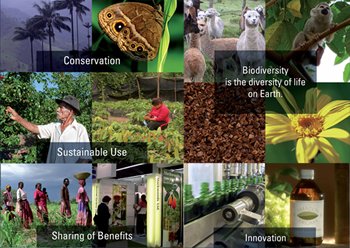 Biodiversity is not only essential for the health of the planet's ecosystems, but also for the livelihood of rural communities in developing countries, where 70 per cent of the world's poor live.
Biodiversity is not only essential for the health of the planet's ecosystems, but also for the livelihood of rural communities in developing countries, where 70 per cent of the world's poor live.
These communities are highly dependent on sourcing natural resources to satisfy their basic needs and to generate income, and they are increasingly threatened by the loss of biodiversity.
Protecting the earth's natural resources is thus an economic imperative as well as an environmental and social aspiration. UNCTAD's BioTrade Initiative embodies these three objectives, affirmed panellists during a roundtable discussion organized by UNCTAD and the Centre for Socio-Eco-Nomic Development at this year's World Trade Organization (WTO) Public Forum.
The panellists looked at the opportunities and challenges for scaling up BioTrade.
The discussion underscored the positive market trends for BioTrade products. UNCTAD highlighted the growing demand for healthy, fair and environmentally-friendly products, especially in the cosmetic, food and health industries.
Revenue for BioTrade companies reached 5.2 billion USD in 2012. Although this is a positive result, it is far below the market potential for BioTrade goods, which has been estimated at 141 billion USD. UNCTAD said this shows there is still a lot of unmet demand and thus room for growth.
But along with new market opportunities come new requirements, and small farmers and traders in developing countries struggle to comply. The markets increasingly demand that products conform to specific norms, meet international health and sanitary standards and comply with private organic, sustainability and Fairtrade labels. The panellists agreed that the increasingly complex mandatory and voluntary standards could represent a major barrier to market access.
For example, it costs up to 500,000 USD and takes about three years for an exporter to comply with the European Union's regulation on novel food and novel food ingredients. For many producers and businesses in developing countries, the process is too costly and time consuming, UNCTAD affirmed.
A related challenge concerns the difficulties small producers face in moving up the supply chain. Scaling up BioTrade means helping small farmers and traders move from collecting and exporting herbs, for example, to producing and trading essential oils. Adding value to the products they export would increase their part of the benefits generated by the trade of biodiversity-related goods, which is precisely one of BioTrade's objectives, asserted Claude Heimo, Senior Advisor for the Centre for Socio-Eco-Nomic Development.
Speaking specifically about the export of medicinal and aromatic plants (MAPs), Mr. Heimo explained that many collectors and growers are trapped in a complex supply chain dominated by middle men and intermediaries, where they lack information and market access. As a result, they accrue little direct benefit from the international MAP market.
"In this context, the UNCTAD BioTrade concept is laying the foundation for the development of more efficient and more responsive supply chain that would offset the above problems and facilitate the marketing of BioTrade products in national and international markets", Mr. Heimo said.
The challenges faced by small and medium enterprises that want to move up the supply chain can be addressed through capacity-building, said Ann Kathrin Zotz, associate expert with the International Trade Centre. But for capacity-building to be effective, she explained, it must address all three levels of the supply chain: production, value addition and sales. She said that for small and medium enterprises (SMEs) to add value to their exports, they need help improving their marketing, branding and sales skills, which includes support in obtaining necessary certificates and labels.
Frank van Rompaey, Geneva Representative of the United Nations Industrial Development Organization, agreed that SMEs must be equipped with the right skills and information, but he insisted that the national quality infrastructure must also be strengthened. He said the services provided by national metrology institutes, accreditation boards and standards bodies are critical to help SMEs export to foreign markets because they can help exporters ensure that their processes and products comply with international standards.
Mr. van Rompaey underscored the importance of taking a demand-side approach when strengthening national quality infrastructure, i.e. focus on the requirements of the intended markets for the different segments of the value chain.
René Gómez-García, Head of the Environmental Business Unit of the Development Bank of Latin America (CAF), reiterated the importance of creating an enabling policy environment. He explained that by supporting the creation of new public policies and BioTrade regulations in the Andean region, CAF had opened the door for the export of 11 novel foods to the EU.
The 2015 WTO Public Forum was organized from 30 September to 2 October. It is an annual event that attracts representatives from civil society, academia, business, the media, governments, parliamentarians and inter-governmental organizations.


